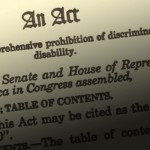
Posted on December 10, 2018
With the midterm elections behind us, disability advocates face an opportunity to make significant legislative gains.
The conventional wisdom holds that gridlock will dominate the 116th U.S. Congress, which begins in January 2019. With a GOP majority in the Senate and a Democrat-controlled House of Representatives, both parties are poised to block each other’s most polarizing bills. But because there will likely be little movement on contentious agenda items, space will open up for other issues to come to the fore. The disability community is uniquely poised to take advantage.
Many disability-related policies were not only front and center in the midterm elections – several unified Democratic and Republican voters.

Posted on February 25, 2016
Question: How many times in the 15 debates for president have moderators specifically asked candidates about issues concerning disability?
a. 1 b. 5 c. 7 d. 11
If you answered b or c, thinking five or seven times sounds about right and should seem reasonable to the one-in-five people watching the debates who have a disability (and the more than 50 million Americans who live with a disability), you’re mistaken. The answer is “a” – one time. In September,
This entry was posted in accessibility, Americans with Disabilities Act, autism, Education, employment, Health and Wellness, inclusion, people with disabilities, public policy, Uncategorized and tagged Alzheimer's, autism, Ben Carson, Bernie Sanders, Convention on the Rights of Persons with Disabilities, Donald Trump, Hillary Clinton, Individuals with Disabilities Education Act, Jeb Bush, John Kasich, Marco Rubio, presidential debates, Social Security Disability Insurance Program, Ted Cruz, Tom Harkin.

Posted on October 13, 2015
Now that the ballyhoo behind the silver anniversary of the Americans with Disabilities Act has died down, please allow me (with considerable regret – believe me) to voice this uncomfortable truth: The ADA, landmark legislation though it is, capable at any turn of protecting the rights of people with disabilities, continues to spawn negative consequences.
As Dr. Ronald Meinert and Francis K. O. Yuen noted in their book, “Controversies and Disputes in Disability and Rehabilitation,” the ADA trivializes real
This entry was posted in accessibility, Americans with Disabilities Act, civil rights, community living, employment, inclusion, people with disabilities, transportation, Uncategorized and tagged ADA, Americans with Disabilities Act, Bragdon v. Abbott, challenging disabilities, Dr. Ronald Meinert, Francis K. O. Yuen, invisible disabilities, marginal disabilities, non-competitive jobs, U.S. Supreme Court, vocational rehabilitation.
Posted on June 30, 2015
Why is the Center for Disabilities Studies launching a new blog? That’s easy: to engage the disability community, the public and policy makers in a provocative discussion of issues with the potential to bring about positive changes in the lives of people with disabilities.
How do we intend to do that? Well, for one thing, advocates and experts, people with disabilities and people without disabilities, will pose challenging questions at critically important times. CDS Director Beth Mineo does that in
This entry was posted in Americans with Disabilities Act, community living, Health and Wellness, inclusion, independent living, intellectual Disabilities, people with disabilities, personal care assistants, Uncategorized and tagged acknowledgement, Americans with Disabilities Act, blog, community living, disability and sexuality, inclusion, independent living, personal care assistants.




